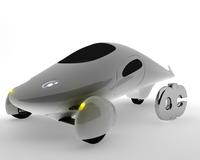A 330 MPG Car for Everyone; Three San Diego Engineers Form Company to Build and Sell Revolutionary 330 MPG Hybrid Car
CARLSBAD, Calif.--Jan. 18, 2006--Accelerated Composites, LLC, has
designed a two-seat passenger car that will achieve up to 330 MPG and sell
for under $20,000. The lightweight composite, hybrid car will post this
fuel efficiency in normal city and highway driving and demonstrate
acceleration and handling similar to that of a Honda Insight. Dubbed the
Aptera(C), the vehicle achieves these remarkable numbers through the use of
cutting-edge materials, manufacturing methods, and a maverick design
mantra.
Unique, optimized aerodynamics gives the Aptera(C) a drag form factor that will be lower than any mass produced car in the world. "It looks like nothing you've ever seen because it performs like nothing you've ever seen," says Accelerated Composites founder and CEO, Steve Fambro. "What we've done is changed the way cars are thought of and designed. Rather than designing to a styling aesthetic, like the big auto makers do, we hew to an efficiency and safety aesthetic. When you do that, math and physics mostly dictate the shape of the car, and in this case, math and physics look awesome."
But aerodynamics is only half of the equation. The other half is weight. The Aptera(C) is made almost entirely of lightweight composites, making it one of the lightest cars on the road. Yet this savings does not come at the cost of safety. In fact, the construction of the car is based on the driver-protection "crash box" found in Formula One race cars. "Composites are enormously strong and lightweight," says Fambro. "That's why all the aircraft manufacturers are switching to them."
So why aren't the auto makers switching? "Cost," says Fambro. "They haven't figured out cost-effective manufacturing processes for composites. But we have."
The Aptera(C) utilizes proprietary composite construction that significantly lowers manufacturing cost when compared to most other composite construction methods, and even steel. The patent-pending "Panelized Automated Composite Construction," or PAC2(C), lends itself to parallel assembly and has a very low initial capitalization. Additionally, AC's patent-pending hybrid technology allows off the shelf engines and electric motors to be seamlessly integrated for a very low cost. Another reason the big automakers aren't jumping to composites is corporate inertia. "They have many billions of dollars invested in factories and infrastructure for making cars the old-fashioned way. They couldn't walk away from that if they wanted to. This is something that only a new company can do, and that's where we come in. We are going to disrupt the status quo."
"We're very serious about this. We're going to produce and sell these cars," says Fambro. "We've got a perfectly timed, market busting product. We have a great team of world class engineers and designers, high-powered marketing and sales experience, and a solid business plan."
Accelerated Composites, LLC, is a Carlsbad-based startup that is disrupting the car design status quo by developing a low cost, 330 MPG hybrid car to be manufactured in Southern California. For investment or press information, please contact Steve Fambro @ 760-908-3051, or sfambro@acceleratedcomposites.com, http://www.acceleratedcomposites.com.



